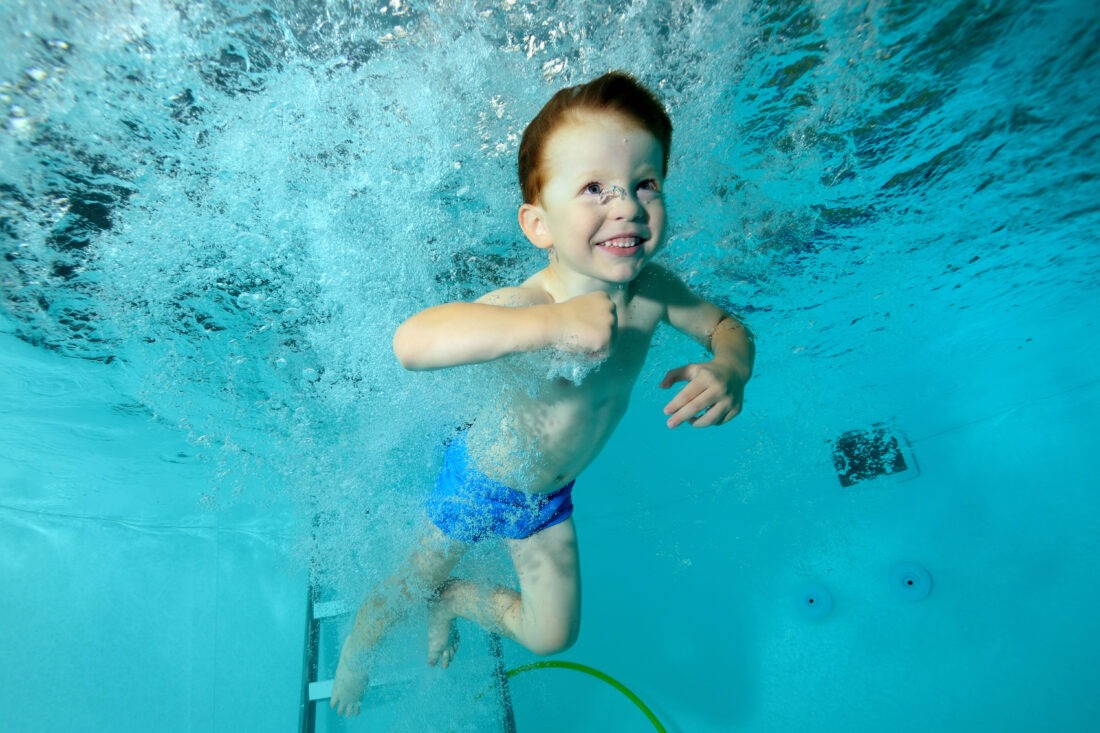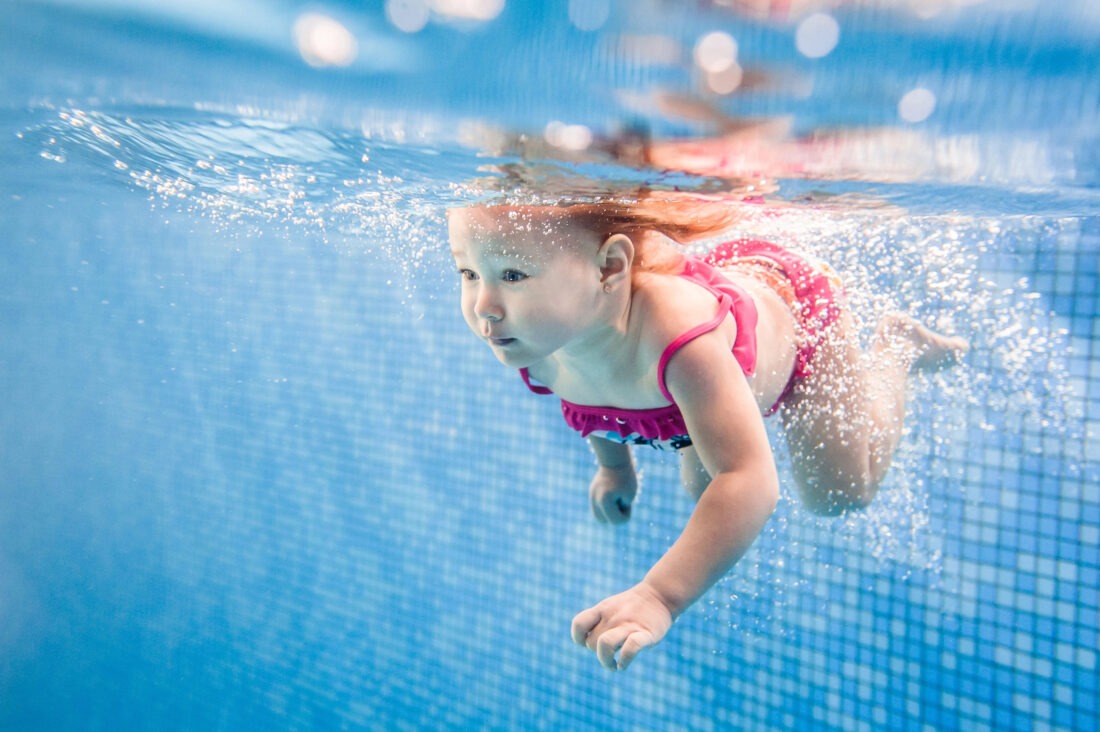ISR Infant Swimming Methods Reflect What Nature and Science Shows Us

Water has an almost magical effect on babies and young children. Children have a natural connection to aquatic environments from the earliest moments in the womb through their first years.
This relationship, combined with proper instruction, creates powerful opportunities for safety and development.
When it comes to water safety, research has consistently shown that formal swimming lessons can reduce the risk of drowning by 88% for children aged 1-4. That’s nothing to scoff at. In fact, it’s something we should look at just a little more closely.
This compelling statistic is why programs like Infant Swimming Resource™ (ISR) have become increasingly popular. Beyond drowning prevention, scientific studies reveal multiple benefits of early aquatic education, including enhanced motor development and improved cognition.
Understanding the Research on Early Swimming
Babies learn through movement and sensory experiences.
The water environment provides a unique opportunity for development that cannot be replicated on land. The buoyancy and resistance of the water create perfect conditions for strengthening muscles, developing coordination, and building neural pathways.
Recent studies have repeatedly demonstrated that exposing infants to formal swimming activities provides significant advantages.
Evidence-based Benefits:
- Improved gross and fine motor skills
- Enhanced visual motion perception
- Better cognitive flexibility
- Advanced response selection accuracy
- Strengthened core stability
- Increased spatial awareness
Developmental Benefits of ISR Infant Swimming
Your baby’s brain and body are hardwired to learn through exploration and movement. As babies float, kick, and move through water, they’re not just learning survival water skills— they’re building crucial neural connections that benefit their overall development.
ISR’s approach aligns with research findings about how infants learn and develop in aquatic environments. Studies show that babies who participate in consistent lessons demonstrate significant improvements in several important areas:
Motor Development
Research indicates that infants in structured swim programs show marked improvement in:
- Core strength and stability
- Balance and coordination
- Gross motor skills
- Fine motor control
- Spatial orientation
Cognitive Development
Scientific studies have identified several cognitive advantages of early swimming instruction:
- Enhanced brain development
- Improved concentration abilities
- Better emotional regulation
- Advanced spatial recognition
- Increased problem-solving capabilities
Here’s what one ISR parent shares, ‘Both of my boys (6 and 3.5 years) started with ISR lessons when they were really little and are both great swimmers. My kids have never used puddle jumpers or floaties, and they are confident in the water. They love swimming.’

Health and Safety Outcomes
Every parent wants their baby to be both safe and healthy. The beauty of ISR infant swimming lies in its ability to accomplish both goals simultaneously.
When babies learn water safety skills, they’re also strengthening their bodies and immune systems in ways that benefit their overall health.
Multiple studies have examined the health implications of infant swimming programs. Research supports the idea that properly structured programs like ISR provide health benefits while maintaining strict protocols.
Health Benefits
Studies demonstrate that infant swimming contributes to:
- Strengthened immune system
- Improved sleep patterns
- Enhanced appetite regulation
- Better overall physical endurance
- Increased cardiovascular health
Safety Considerations
ISR’s methods incorporate research-based safety measures:
- Age-appropriate skill progression
- Individualized instruction
- Careful monitoring of physical responses
- Structured learning sequences
- Progressive skill building
Evidence-Based Methods That Work with Nature
Babies don’t learn like adults do. They need short, focused periods of learning followed by time to process and rest. ISR’s teaching methodology aligns perfectly with how infant brains naturally develop and retain information.
ISR’s approach to infant swimming is supported by research showing the effectiveness of:
Structured Learning
- Brief, focused sessions
- One-on-one instruction
- Consistent skill reinforcement
- Progressive skill development
- Age-appropriate techniques
Skill Acquisition
Research shows that infants can master essential water safety skills through:
- Regular practice
- Sequential learning
- Guided instruction
- Positive reinforcement
- Developmental appropriateness
Parents often report that their ISR-trained children show increased confidence not just in the water but in other physical activities as well.
This makes perfect sense – the body awareness and control developed during swimming lessons transfer to everyday movements and challenges.
Whether climbing stairs, learning to run, or mastering new playground equipment, these early aquatic experiences create a foundation for lifelong physical confidence.
Parents are ISR’s biggest fans! One mom says this about the program: ‘My baby loves the water and is so proud of himself that he can flip over and float. Both kids are confident in their skills, and there is really no price you can put on the value of their safety.’
Long-Term Benefits of Early Swimming
The advantages of infant swimming instruction don’t stop when lessons end. Children who learn these skills early in life show remarkable long-term advantages in both physical and mental development.
Studies tracking children who participated in infant swimming programs reveal:
Physical Benefits
- Advanced motor development
- Better coordination
- Improved strength
- Enhanced body awareness
- Superior balance skills
Cognitive Advantages
- Better visual-motor skills
- Advanced language development
- Improved mathematical reasoning
- Enhanced problem-solving abilities
- Superior spatial awareness
Research-Supported Results
When you watch a group of children play, you’ll notice something special about the ones who started swimming early. Their movements are often more coordinated, their spatial awareness more developed, and their problem-solving skills are more advanced than their peers.
These observations are backed by scientific studies showing that infants who participate in swimming programs demonstrate significant advantages.
Development Markers
- Motor skills: 15 months ahead of peers
- Language development: 10 months advanced
- Physical coordination: 11 months ahead
- Mathematical reasoning: 6 months advanced
Safety Skills
- Effective self-rescue techniques
- Appropriate water safety responses
- Strong survival skills
- Reliable safety behaviors
- Consistent water competence
Beyond the Numbers: The Impact of Infant Swimming
Your child’s early years lay the foundation for a lifetime of learning and development. Infant Swimming Resource™ (ISR) doesn’t just teach water safety – it provides a comprehensive approach to early childhood development that works with your child’s natural learning patterns.
The scientific evidence consistently shows that structured, age-appropriate aquatic education offers numerous benefits while building crucial safety skills.
Ready to give your child these proven benefits? Learn more about how ISR infant swimming classes can help your little one develop these essential skills and abilities!



